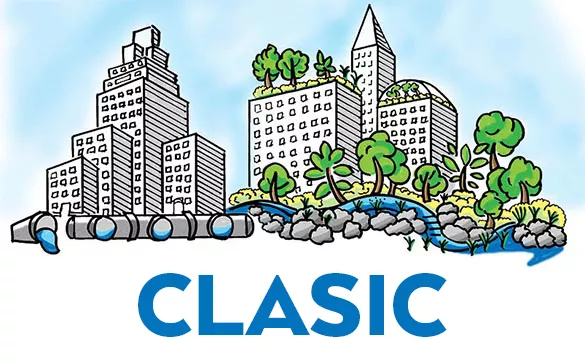CLASIC is a user-informed screening tool that utilizes a life cycle cost framework to support implementation of stormwater infrastructure, including green, hybrid green-gray, and gray infrastructure practices. The CLASIC tool integrates Multiple-Criteria Decision Analysis (MCDA), which enables consideration of co-benefits for green infrastructure. There are three integrated components in the CLASIC tool: life cycle cost; performance; and co-benefits.

Overview
The goal of the CLASIC decision support system is to develop a robust, peer-reviewed, and end-user informed Life Cycle Cost (LCC) framework model for stormwater infrastructure alternatives that can accommodate regional and scale variations to support integrated planning at a municipal scale. Expected users of the CLASIC tool include managers and operators of regulated stormwater systems (e.g., municipalities, counties, cities, and utilities), consultants, academics, and others.
Related Projects (funded by WRF)
- Economic Framework and Tools for Quantifying and Monetizing the Triple Bottom Line Benefits of Green Stormwater Infrastructure (4852)
- Toolbox for Completing an Alternatives Analysis as Part of an Integrated Planning Approach to Water Quality Compliance (4854)
- Urban Stormwater BMP Database Annual Update (4968)
Tool Platform
The tool is hosted on a cloud-based web platform so that it is fully interfaced with geographical information systems (GIS) and also includes interaction with national databases to upload data for the modeled area at a community level. The CLASIC tool has incorporated a Multivariate Adaptive Constructed Analogs (MACA) method for simulating climate scenarios.
Additional Information
This project was funded by the Environmental Protection Agency's Office of Research and Development (ORD) through the grant opportunity “National Priorities: Life Cycle Costs of Water Infrastructure Alternatives” (EPA Grant Number: R836173). Additional information about the project is available through the EPA.
Advances in Water Research article (2021) - "CLASIC Advances Stormwater Management"
Journal of New England Water Environment Association article (2025) - "Holistic Stormwater Management by Integrating Performance, Life Cycle Cost, and Benefits: An Overview of Research from WRF"
-
Team Members
- University of Maryland (EPA Region 3 Environmental Finance Center)
- University of Utah
- Colorado State University
- Wichita State University (EPA Region 7 Environmental Finance Center)
- University of Georgia
- Water Environment Federation (WEF)
- Geosyntec / Wright Water Engineers
-
Collaborating Partners
- American Society of Civil Engineers (ASCE) / Environmental & Water Resources Institute (EWRI)
- American Rivers